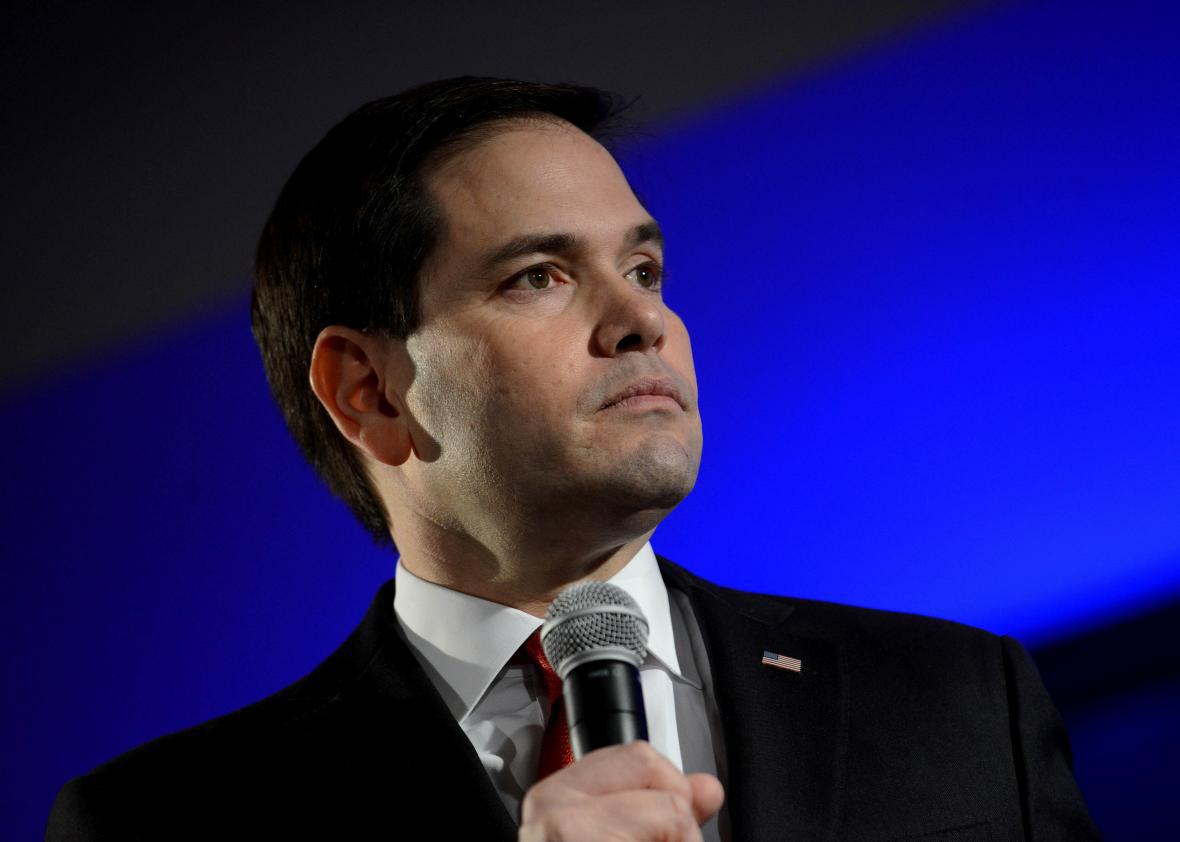Marco Rubio, a man once hyped as the savior of the Republican Party, has effectively resigned himself to playing spoiler in the GOP race. The candidate’s campaign director told CNN on Friday morning that Rubio’s supporters in Ohio should cast their votes instead for John Kasich—a move designed to prevent Donald Trump from winning the state’s winner-take-all primary next week and leaving the door open for a contested convention later this summer. “If you are a Republican primary voter in Ohio and you want to defeat Donald Trump, your best chance in Ohio is John Kasich,” Alex Conant said in an interview on the cable network, adding: “That’s stating the obvious.”
Rubio’s been trying to sell the idea of a contested convention to donors for weeks—and Mitt Romney publicly got on board with it last week—but Conant’s direct pitch to voters on Friday was jarring given it came from a top aide of a candidate who continues to fight for his political life. It’s one thing for a candidate not to compete in a state he’s unlikely to win, it’s quite another to offer a semi-endorsement of a rival he’s running against. (Asked about the strategy at a press conference later in the morning, Rubio was careful not to explicitly tell his supporters to vote for someone else. He came close, though, conceding, “Clearly, John Kasich has a better chance of winning Ohio than I do.”)
Rubio and much of the GOP establishment are hoping that Rubio’s supporters in Ohio can give Kasich the bump he needs to beat Trump in the Buckeye State, which holds its delegate-heavy primary on Tuesday. Currently, Trump and Kasich are running neck and neck in the state, with the celebrity billionaire leading the Ohio governor by 2.5 points in an average of recent polls. Kasich, though, came out on top in the most recent survey—conducted by Fox News earlier this week—by 5 points, 34 percent to 29 percent. Rubio is averaging about 7 percent support in the state—suggesting that if his supporters really do as he says, they actually could deny Trump the 66 GOP delegates that will be up for grabs in Ohio.
Rubio, meanwhile, is no doubt hoping that Kasich urges his own supporters in Florida to return the favor. Rubio has been going for broke in his home state in hopes of bringing his campaign back from the dead with a victory in its own Tuesday winner-take-all primary. Currently, it doesn’t look good for the Florida senator. He trails Trump by an average of nearly 15 points and hasn’t led a major state poll in more than a year. Kasich is polling at about 8 or 9 percent in the state—so even if he were to send his Florida supporters to Team Rubio, Trump would still be the favorite to claim the state’s 99 delegates. Worse still for Rubio, a state-specific endorsement from Kasich does not appear to be forthcoming.
To date, Trump has won about 44 percent of the delegates that have been awarded—a plurality that has given him a commanding lead on his rivals. Next Tuesday’s primaries, though, represent a major test for whether Trump will be able to turn that lead into an insurmountable one before the Republican convention. If the billionaire wins both Florida and Ohio, he’d need to win roughly half of the remaining delegates in the remaining contests to reach the majority number needed to secure the nomination. That’s certainly doable—particularly given Rubio and Kasich’s support would likely dry up if they lose their home states, and given a back half of the primary calendar that should be friendlier to Trump than it will be to Ted Cruz.
If Trump loses one or both of those states, though, the math gets considerably more difficult for him. According to NBC News’ estimate, he’d need to win nearly 60 percent of the remaining delegates if he wins Florida but loses Ohio, roughly two-thirds of the remaining delegates if he loses Florida but wins Ohio, and nearly 70 percent of the remaining delegates if he loses both to reach that 1,237 majority number. If he can’t do that, the Republicans could be looking at a contested convention. And if that happens, all bets are off.
